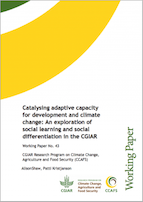Catalysing adaptive capacity for development and climate change: An exploration of social learning and social differentiation in the CGIAR


Abstract
There is convergence between current theory and practice in global environmental change research and development communities on the importance of approaches that aim to ‘engage and embed’, i.e. engage diverse and relevant actors in knowledge creation and embed scientific information into societal contexts. Social learning has emerged as a way to both approach and characterise innovative ways of doing this. Defined here as “a change in understanding that goes beyond the individual to become situated within wider social units or communities of practice through social interactions between actors within social networks” (Reed et al. 2010), a social learning approach situates scientific research as just one form of specialised knowledge amidst other contextual knowledge.
Co-learning – by bringing diverse knowledge and social worlds together to exchange needs, values and norms – is considered necessary for addressing complex, wicked problems and for building decision processes and adaptive structures that help navigate uncertain futures. Including socially differentiated groups into processes of knowledge creation and decision- making may fundamentally alter what questions are asked, how changes in practices are framed and how to break down systemic patterns of vulnerability and marginalisation. This paper investigates the synergies (and trade-offs) associated with integrating socially differentiated stakeholders and/or groups – the poor, women, elderly, youth and indigenous – into social learning processes aimed at addressing poverty reduction, livelihood development and longer term resilience.
An exploratory scan of CGIAR identifies projects that engage socially differentiated groups in processes of social learning. Cases were characterised for their treatment of i) the particular context, including rationale for the engagement of socially differentiated groups, ii) the design of engagement interfaces, iii) the type of learning loops occurring, iv) particular channels that contributed to learning across networks and, where applicable, v) the outcomes and lessons from the learning process. The findings suggest that diverse forms of social differentiation and learning are occurring across many of CGIAR’s fifteen research centres. This is in part due to institutional reform that has put an increasing emphasis on gender strategies and monitored development outcomes. A more explicit recognition of the role and ‘added value’ that social learning research approaches have can enhance its visibility and ultimately the effectiveness of CGIAR’s vast research partnerships.
Suggested citation:
Shaw, A., and Kristjanson, P. 2013. Catalysing Learning for Development and Climate Change. An exploration of social learning and social differentiation in CGIAR. CCAFS Working Paper no.43. CGIAR Research Programme on Climate Change, Agriculture and Food Security (CCAFS). Copenhagen, Denmark. Available online at: www.ccafs.cgiar.org
(0) Comments
There is no content